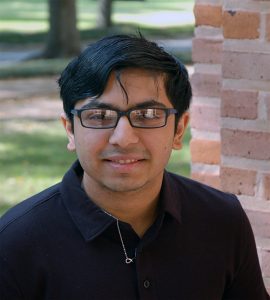 When Sahil Patnayakuni began looking at colleges in high school, he made a trip to Austin to consult with his grand-uncle. “Dr. Aggarwal is Professor Emeritus in the Department of Electrical and Computer Engineering at the University of Texas at Austin. When he learned I wanted to find a school that had a strong engineering program but would also allow me to explore subjects outside my major, he suggested I look at Rice,” said Patnayakuni.
When Sahil Patnayakuni began looking at colleges in high school, he made a trip to Austin to consult with his grand-uncle. “Dr. Aggarwal is Professor Emeritus in the Department of Electrical and Computer Engineering at the University of Texas at Austin. When he learned I wanted to find a school that had a strong engineering program but would also allow me to explore subjects outside my major, he suggested I look at Rice,” said Patnayakuni.
Sahil –now a sophomore CS major– said he toured Rice, liked what he saw, and realized it was a place where students could work on interesting engineering projects but also kick back and enjoy spending time with their friends. He said, “I was seriously considering three offers, but Rice was the one with the best breadth of courses. That’s why I picked Rice – it offers many opportunities outside your chosen field, and I’ve taken a lot of interesting courses in my first two years here.”
Patnayakuni’s interest in engineering began with the environment in his hometown –Huntsville, Alabama. “The city created a startup generator, subsidizing the infrastructure needed by small companies in Research Park,” he said. “There were enough local companies for my high school to create a shadowing program and I spent a week shadowing developers for a contractor supplying tech stuff to NASA.”
Robotics competitions in high school had whet his appetite for programming, and he dove into the computer science major as soon as he arrived at Rice.
“COMP 182 helped me realize that I’m most interested in learning and implementing algorithms; I may go to grad school or work for a research-based company. What makes Rice so good at preparing us for getting a job is how they give us a strong foundational theory that helps you understand the whole field,” said Patnayakuni. “I feel I know enough to speak intelligently about a lot of fields in interviews. Having that foundational theory gives you the ability to pick up new ideas and technologies rapidly, which is important in this industry.”
 He has completed several internships and discovered that he works best when faced with problems that challenge his theoretical and mathematical knowledge. “Right after we had talked about hidden Markov models in COMP 182, I was working in a biotech lab that used it in an algorithm as they attempted to diagnose genetic disorders in children. That was much more engaging and interesting to me than the types of work I’d done previously.”
He has completed several internships and discovered that he works best when faced with problems that challenge his theoretical and mathematical knowledge. “Right after we had talked about hidden Markov models in COMP 182, I was working in a biotech lab that used it in an algorithm as they attempted to diagnose genetic disorders in children. That was much more engaging and interesting to me than the types of work I’d done previously.”
Patnayakuni said that his previous internships involved tasks like making an interface work or writing a quick script that solves a particular problem. “Those types of problems can be difficult and challenging. In one internship, I needed to provide a view into the communications between two systems in such a way that people who were not well-versed in programming could see what was going on between the two computers. I created a GUI in HTML and Python for them. You just figure out what you need to do and hook it up.”
But his job satisfaction was much higher when he worked on the theoretical challenges in the biotech lab, so now he is seeking internships that challenge his mind in a similar way.
He also gives his mind a break by actively pursuing non-CS activities. “Do something outside of class that you enjoy,” he advises prospective students. “As a CS student, you’ll probably be doing a lot of work in a week and you need something to fall back on that lets you unwind. I play a lot of video games with other students in a club called E-sports.”
He also offers some time-management advice to new students. “I think if you come to Rice, it’s likely that high school was not too difficult for you. You are really going to have to manage your time in CS. It’s not like high school where you could pull an all-nighter and get it done. That doesn’t work in CS. Even if you work for a long time on a problem, you might not solve it. Our professors say people who start early get better grades, so manage your time and start your homework sets early.”
Patnayakuni also said seeking help early will save time in the long run. “Go to the TA sessions and ask for help. It is a good idea to take a quick look at the homework as soon as it is assigned and immediately think of questions or clarifications to ask the TA’s. That way the as soon as you hit a stumbling block, you have several things prepared to ask the TA. I was used to working alone in high school, but if you want to make the most of your time management, going to the TA sessions and asking for help [when you are stuck] can really speed up your work.”
Sahil Patnayakuni arrived as a CS Major at Rice University in Fall 2015.
